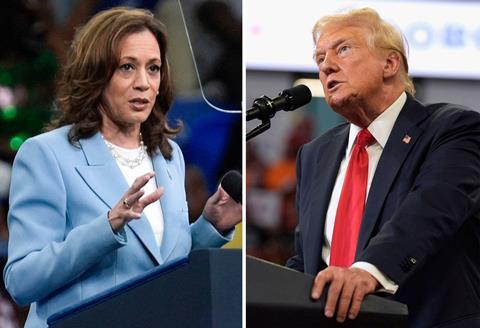Faithful Christians voted in opposite directions during this election, says Amanda Held Opelt. But we can all agree that neither Trump nor Harris can save America. Christians have an opportunity to be a non-anxious presence in the face of political division

The days and weeks following an election in America are always time for reflection, analysis and discussion. Casual voters and professional political pundits alike delve into the hows, whys and what ifs. Post mortems are conducted on the losing campaign and scholars hastily project what the history books will write about the winning candidate - what they got right and whether their message tapped into the American zeitgeist.
But this year, the mood among progressive voters and Democrats seems particularly morose, alternating between shock, rage, and sober soul-searching.
Our ability to live out our gospel mandate is not compromised by whoever is sitting on a worldly throne
This solemnity makes sense to me. Donald Trump defeated Kamala Harris with a comfortable majority, not just in the electoral college but in the popular vote as well. His unyielding resonance with the American people - despite his felony conviction, racially charged rhetoric and the myriad accusations of sexual assault - is mystifying to some and infuriating to others.
Sweeping generalisations
For some, the only way to explain his sweeping success against a highly qualified Black woman is to conclude that the majority of American citizens are racist and misogynist. But for many others, Trump’s triumph was an indictment of the shifting moral landscape of the political left, with all who voted for him being righteous defenders of traditional American values.
But my experience with my neighbours and my unique geographic location has forced me to challenge these simple rationalisations. I live in a swing county in a swing state. My little corner of western North Carolina was hit hard by hurricane Helene, and lots of people were hurting economically before the storm, struggling to feed their families and make rent payments.
I have dear friends and family who voted for Harris, and others who voted for Trump. I know faithful Christians whose convictions about how best to love their neighbour and live out Christlikeness in the political sphere led them to vote for Harris, while similar convictions led other faithful Christians to vote Trump.
There are no uncomplicated explanations for this. I know I’m not the only one wrestling with the question: What’s really going on within the soul of America? As much as we like sound bites and conclusive hot takes, we may need to embrace the notion that the results of this election can’t be boiled down to one simple narrative.
Theology, compassion and hope
I believe those of us who embrace Christ as Lord and look to the Bible as our primary source of wisdom are uniquely equipped to wade into the waters of deep dialogue around these elections results, and to do so with grace.
Firstly, Christians embrace a healthy theology of sin and brokenness. This recognises that all human beings step into every decision burdened by some degree of moral complication or failure. They also carry complex pain from past experiences with other human beings. The desires that nudge us towards one candidate or another may be holy. But they may also be tainted by fear, prejudice or selfish inclinations that are far from holy.
Acknowledging the fallenness of our motives should not lead us to despair, but to compassion and humility, knowing that many of us are just trying to muddle through, executing our civic responsibilities before God and praying for wisdom.
I have dear friends and family who voted for Harris, and others who voted for Trump
Romans 12:5 commands that we “rejoice with those who rejoice and mourn with those who mourn.” This means we are to step into one another’s stories, to empathise with our neighbor’s perspective before passing judgement. Extending the benefit of the doubt doesn’t mean compromising our convictions. It means assuming that voting choices may involve histories we are unaware of, pain we don’t understand and challenges that are more nuanced than we may presume.
And perhaps even more powerful than right theology and robust compassion is the hope that Christians carry into every conversation. We know that our ambitions do not rest on the shoulders of a political victor. Rather, we place our trust in a prince of peace who rules an invisible kingdom.
According to 2 Peter 1:3, we’ve been given everything we need for life and godliness. These words were written to a church struggling under the tyrannical reign of a godless Roman empire. Our ability to live out our gospel mandate is not compromised by whoever happens to be sitting on a worldly throne.
A non-anxious presence
This glorious reality can position the Christian above the emotionally charged name-calling and blame shifting that goes on in the wake of an election. We are able to offer a non-anxious presence to all political discourse, knowing that fullness of life in Christ is never under threat.
Moreover, we can reject the compulsion to crown either candidate as America’s saviour or categorise either party as purely righteous. We know that politicians and parties do not fill the role that Christ and the kingdom fill in our lives.
My prayer for my nation is that Christians would infuse the national dialogue with a proper understanding of human nature, a deep-seated compassion and an enduring hope that transcends this election.
But before we can do that, we must believe the truth for ourselves, rather than being swept away in the vitriol and anxiety that is raging in this political moment. And demonstrating right belief in the midst of this torrent is no small task.




































1 Reader's comment